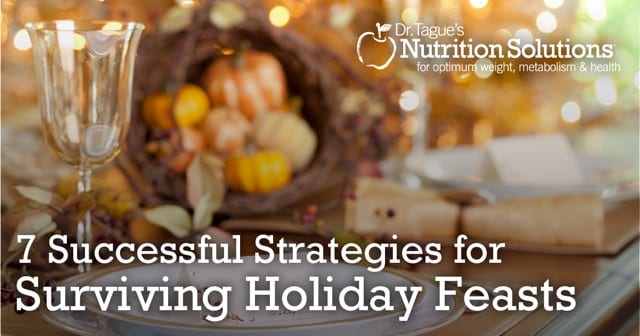
The holidays keep rolling around year after year! What a great season! We each have much to be thankful for, and it is always a blessing to give gifts and host friends and family members for memorable and fun feasts and gatherings.
Unfortunately, the holidays typically involve less than ideal foods. If not careful, we can easily gain 5-10 pounds of unwanted weight gain between October 31st and January 1st! In fact, for some, the only weight gain they have during the entire year is during those few weeks. It is simply a difficult time to control food choices and portion sizes. It seems everyone is feasting, and they want us to join them! The temptation can be hard to resist.
However, I’ve seen countless patients stay in control during the holidays. They have not only prevented unwanted weight gain, they have actually lost significant weight. Let’s look at seven of their most successful holiday strategies. Although these strategies work all year long, they are easy to take advantage of during any holiday!
Strategy #1: Eat a protein-rich breakfast daily.
We know from research that a protein-rich breakfast is associated with a lower body weight. There are two mechanisms. The protein forces an increased metabolism rate (unlike typical American breakfasts of a sugar-laden coffee, juice, a bagel, or cereals, which are all carbohydrate based). Further, a quality, protein-based breakfast lowers the appetite in the afternoon and evening, preventing the typical evening overeating. For most of our patients, this breakfast strategy involves convenient meal replacements, such as a ready to drink Chocolate Dream Shake and/or our instant Maple Brown Sugar Oatmeal (just add hot water).
Strategy #2: Get 7 ½ hours of sleep every night.
Schedules can be demanding and irregular during the holidays. However, sleep is even more important during times of irregular eating and busy holiday schedules. Remember, sleeping 7 ½ hours increases the metabolism rate and reduces food cravings… it really works!!!
Strategy #3: Stay hydrated with metabolism-boosting beverages.
Mild dehydration can feel like hunger, triggering the eating of unhealthy snacks. Mild dehydration will also cause fatigue, which slows activity and the metabolism. On the other hand, beverages like ice-cold water, coffee (3-5 cups per day) and tea actually SPEED UP the metabolism. Stay hydrated, with wise choices of beverages!
Strategy #4: Commit to fitness time daily.
For me, this means a morning run lasting ~23 minutes. I make 9 minutes my minimum goal since 9+ minutes of fitness time daily postpones the age of death by 6.2 years on average. Running is not appropriate for many people. Joint pain, or not enjoying running, is enough reason to choose another activity. Find something that increases your heart rate and makes you short of breath for at least 9 minutes every day.
Note: Kansas ranks 42nd out of 50 states for lowest average amount of fitness time, so let’s do our part to improve our ranking! Kansans tend to lack the healthy habit of daily fitness time!
Strategy #5: Keep healthy snacks within reach.
One example that is very compatible with the holiday season is mixed nuts. Eating 1 oz as a daily snack helps lower risk of overall death by 17%, heart disease risk by 29% and diabetes risk by 20%. Watch portion sizes, because nuts are high in fat calories.
Meal replacements are ideal snacks. They are tasty, and nutritious! Keep your favorite bar at your desk, in your car, and in your pantry so they are always available.
Strategy #6: Fight fatigue and weight gain with Energy Plus.
I custom designed the Energy Plus formula to support energy levels and a healthy metabolism rate. Prior to beginning our treatment plan, most of our patients tended toward a sluggish metabolism and fatigue. A sluggish metabolism will sabotage weight loss efforts when special holiday foods come along. Energy Plus is a simple supplement that is consistently one of our most popular supplements, because it works! Learn more here.
Strategy #7: Red Wine.
Drinking small to moderate amounts of red wine (2-5 oz) lowers heart attack risk 35%. Red wine is the only alcohol that is not associated with an increase of blood pressure. In addition, red wine does not seem to cause abdominal weight gain like other forms of alcohol. If you are going to consume alcohol, go red! Then, limit amounts (1 glass for women, 1-2 for men).
Summary:
The holidays don’t have to mean weight gain. If your routine is healthy, the occasional high calorie “feast” meals will have little effect on your weight. Then, when special meals come along, it will have minimal, if any, affect on your weight. Use the above strategies to safeguard yourself. Even if those around you are not being intentional in promoting their health and weight control, you can be different. Embrace healthy habits through the holidays, it works!
And remember, Optimum Health is ALWAYS worth the effort.
For Optimum Health,
Rick Tague, M.D., M.P.H.
